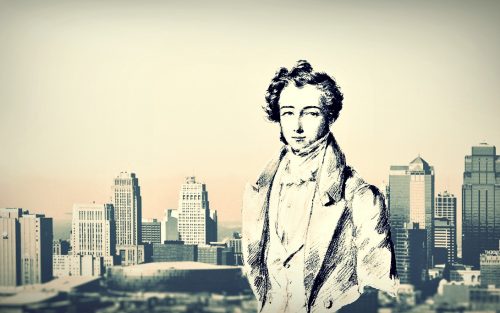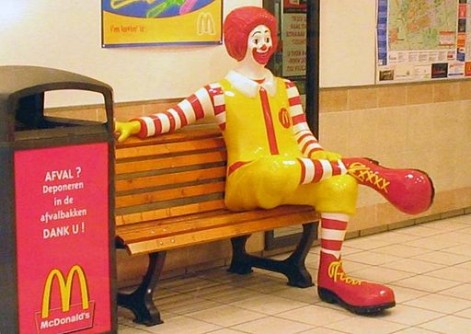So the Romney campaign, now and again, actually countered the world of Girls by identifying itself with the best or at least the most edifying cable series -- Friday Night Lights. FNL actually begin as network show and remained comparatively restrained but not unrealistically prudish in its use of language, sexual situations, and so forth when it was forced to migrate to cable (and back again to the network). The show certainly understands moral virtue -- who we are and what we’re supposed to -- in a somewhat old-fashioned but not all that religious a way. Taking place in west Texas, it is has a very Southern understanding of what’s important about life.
Friday Night Lights centers on the football team’s coach -- Eric Taylor -- who is an altogether admirable and talented leader of men, meaning leader of warriors. For the men schooled by his leadership, a key formative experience of their lives -- in some cases, the only great experience of their lives -- will be how they perform as part of the team. And identifying with the team -- being "Panthers" -- is, of course in many ways the heart of the town, the only thing that genuinely invigorates the often disappointing and dreary lives of most of its citizens. The football team is what passes for the town’s common good. (Eventually the town is divided by the addition of the East Dillon team.)
Romney sometimes psyched up his crowds with a spin on the inspirational words with which Coach Taylor concludes each of his pre-game talks: “Clear Eyes, Full Hearts, Can’t Lose.” Those plain yet poetic words really do say it all. The heart -- meaning some mixture of courage and love -- is in the center. But the heart is guided by the eyes -- or not just the brain. A true warrior sees things as they are, remains undaunted, and acts accordingly. If our eyes as clear or undeceived and our hearts are as full as they can be, we can be confident that we can’t lose, that we’ve done everything we can to deserve to win. There’s nothing pious about the coach’s words. They ain’t no prayer. They’re the code of living of the warrior, the southern stoic, the classical man of moral virtue. The coach, of course, respects religion and sometimes joins his players in prayer, but that’s what any Southern gentleman -- any Southern stoic -- would do.
One sign of Romney’s tone deafness is the way he changed Coach Taylor’s words: “Clear Eyes, Full Hearts, America Can’t Lose.” Not only is the terse poetic cadence -- the semi-Haiku -- of the original screwed up, but Romney never called for Americans to sacrifice for a team as citizens. It is true that Romney’s strongest support was in America’s small-town football belt (he got 75 percent of the vote in Odessa, Texas, the real-life location of Friday Night Lights' stadium), and certainly some voters were moved by what he was saying by appropriating the coach’s words for his campaign.
Or maybe it’s more true that they voted for Romney because of those words, whether or not they really believed he owned them. Romney seemed ignorant of the genuinely universal significance of what the coach says and does, the ways his example might actually inspire most Americans. He probably never really saw the show.
During the campaign, I thought of writing an article entitled “Coach Eric Taylor’s Seven Habits for Highly Effective Leaders” and somehow getting it to Romney’s people. No doubt it would have worked wonders on the Romney brand. But it’s too late for that now. So I’m going to share some inconvenient facts from the show that Republicans have to take into account in getting the eyes clear and even their hearts properly filled in preparing themselves for future victories.
Friday Night Lights, just as much as or more than Girls, is about how hard it is to find meaningful work and personal love these days in our country. Its focus, of course, is on a quite different, more economically and educationally unfortunate, and arguably more deserving demographic. This demographic -- shrinking small-town America, the sinking lower middle class -- is, we learn from Charles Murray, viewed with a mixture of indifference and condescension by our sophisticated and increasingly libertarian meritocratic elite.
Romney, with his notorious "47 percent" comment, seemed sometimes to share that condescension. He’s okay with the God and the guns that prevail in the sticks, but maybe not so much with the work ethic of the many out there who don’t pay income tax. From the point of view of FNL, both of our parties seems too oligarchic, too oriented around the thought that true meritocracy is based on economic productivity.
The show’s true meritocrat -- its true aristocrat -- is, of course, Coach Taylor himself. He’s the standard when it comes to meaningful work and personal love. His virtue and talents aren’t dependent on the limitations of a small town. In the last show, he easily “transitions” to coaching an urban Philly team, and he turned down an offer to coach a Division 1 college team. His work is meaningful, in part, because it’s about a kind of success that has little to do with money, and because it develops and reveals the character -- disciplined pride in the service of sometimes sacrificial love -- that makes the man.
Taylor's success as a coach isn’t, finally, at the expense of his family, and he knows, if not always and with some reluctance, that his more bookish, relationally sensitive, toughly) loving, equally aristocratic (meaning authentically excellent) wife has virtues and talents that complement or complete his. She sees the good in students the warrior overlooks (because they’re not warriors). Because his excellence is universal and his devotion to his wife so deeply personal, he finds himself at home wherever he can coach and share a life with her. He was in no way defined by the place Dillon, and for him it certainly isn’t “Texas forever.”
It’s only odd, at first, to think of football as more meritocratic than business. But there’s no affirmative action in football. It would too obviously be at the expense of victory. Neither is there any real place for cronyism -- as in crony capitalism. The same goes for easygoing popularity or a “consumer orientation.” Race and class are seen as as inessential as they really are in knowing who a man is. One sign of Coach Taylor’s human excellence is his players never doubt -- at least once they get to know him -- that he doesn’t see or judge men as members of races or classes.
Especially after the stunning turnaround he achieved at East Dillon (the deprived high school to which he banished by the town’s oligarchs on the bad and much more black side of town) there’s no doubt that Coach Taylor could have gotten elected to office in Dillon with plenty of black vote. The coach, in the unlikely or highly desperate event that he would have run, would have campaigned against the white Country Clubbers. He never could take them seriously, and he mainly experienced them as a sometimes cruel and arbitrary impediment to his educational mission. Although usually observant Christians, they weren’t much about the business of cultivating the souls of all the deserving young men and women in town.
Much of the show is about very disadvantaged players often heroically struggling to make their dysfunctional families functional. They know far more clearly than the Girls that a loving family and familial responsibility are the bottom line for human significance and human happiness. The team and teammates function to some extent as a family, but they don’t replace the need for a real family -- a biological family. And Coach Taylor is usually careful -- in his laconic way -- to keep the distance required not to be too much of a father figure for any of his players. Perhaps the two most memorable “narratives” that present themselves across the whole range of the show’s seasons are the artistic overachieving quarterback Matt Saracen knocking himself out to care all alone for his grandmother with Alzheimers and the two Riggins brothers -- whose hearts are fuller than their eyes are clear -- being a family against all odds. Tim Riggins, the noblest of the warriors and so not really college material, serves what should have been his brother’s time in prison with the imperatives of family in mind.
The point of these “narratives” is that the 47 percent is hardly in the thrall of government dependency. It’s a narrative that subverts the one pushed those who divide our country into the “makers” and the “takers.” The truth is that neither the government, the church, or the locals are doing much at all to help these families sustain themselves, and it is equally true that these young men are usually grateful for anything they’ve received.
There is a connection, of course, between the quality of personal love and the availability of meaningful work. Those with intellectual gifts leave Dillon (such as the coach and Matt) -- and often don’t look back. Those like Tim Riggins who say -- with some irony -- “Texas forever” have a lot less choice. Most of the jobs in a small town now depend upon intellectual labor that’s done somewhere else -- at, for example, the home office of Walmart. And local businesses, often run by people who aren’t so brainy or sensible (such as Buddy Garrity), often flail and fail. The only jobs worthy of a man (warrior), we might say, are football coach and police officer. It’s pretty much impossible even to make a living on one’s own as a mechanic.
FNL is all about real men and women living admirably and having to struggle much harder than they should to sustain meaningful work and personal love. They’re not feckless or lazy, and it seems that even the jobs Romney said he would create wouldn’t be for them. If these young men are nonetheless better off than the girls on Girls in some crucial ways, it’s party because they have been slapped pretty hard by the adversity that builds character. And thanks to football, a strong and persistent southern sense of family, and, yes, even religion, they have been, despite at all, better raised.
The right way for the Republican party to right itself is to find a leader whose eyes are clear about the threats to a dignified life shaped by love and work portrayed in both Girls and in Friday Night Lights. That means the Republicans have to become less oligarchic and less libertarian -- and more genuinely meritocratic -- than they have been in recent years.





